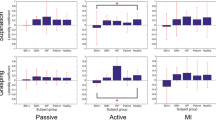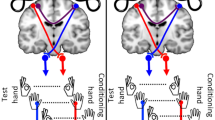Abstract
In mild cognitive impairment (MCI), the corpus callosum is known to be affected structurally. We evaluated callosal function by interhemispheric inhibition (IHI) using transcranial magnetic stimulation (TMS) in MCI patients. We investigated 12 amnestic MCI patients and 16 healthy age-matched control subjects. The IHI was studied with a paired-pulse TMS technique. The conditioning TMS was given over the right primary motor cortex (M1) and the test TMS over the left M1. Motor evoked potentials were recorded from the relaxed first dorsal interosseous muscle. We also studied other motor cortical circuit functions; short-latency afferent inhibition (SAI), short-interval intracortical inhibition (SICI) and intracortical facilitation (ICF). Both the amount of IHI and SAI were significantly reduced in MCI patients as compared with control subjects, whereas SICI or ICF did not differ between them. The degree of IHI significantly correlated with neither the mini-mental state examination score nor the degree of SAI. Our results suggest that transcallosal connection between bilateral M1 is primarily involved in MCI, regardless of SAI dysfunction.




Similar content being viewed by others
References
Agosta F, Rocca MA, Pagani E, Absinta M, Magnani G, Marcone A et al (2010) Sensorimotor network rewiring in mild cognitive impairment and Alzheimer’s disease. Hum Brain Mapp 31:515–525
Alagona G, Bella R, Ferri R, Carnemolla A, Pappalardo A, Constanzo E, Pennisi G (2001) Transcranial magnetic stimulation in Alzheimer disease: motor cortex excitability and cognitive severity. Neurosci Lett 314:57–60
Albert MS, DeKosky ST, Dickson D, Dubois B, Feldman HH, Fox NC et al (2011) The diagnosis of mild cognitive impairment due to Alzheimer’s disease: recommendations from the national institute on aging and Alzheimer’s association workgroup. Alzheimers Dement 7:270–279
Chen R (2004) Interactions between inhibitory and excitatory circuits in the human motor cortex. Exp Brain Res 154:1–10
Chua TC, Wen W, Slavin MJ, Sachdev PS (2008) Diffusion tensor imaging in mild cognitive impairment and Alzheimer’s disease: a review. Curr Opin Neurol 21:83–92
Di Lazzaro V, Oliviero A, Tonali PA, Marra C, Daniele A, Profice P et al (2002) Noninvasive in vivo assessment of cholinergic cortical circuits in AD using transcranial magnetic stimulation. Neurology 59:392–397
Di Lazzaro V, Oliviero A, Pilato F, Saturno E, Dileone M, Marra C et al (2004) Motor cortex hyperexcitability to transcranial magnetic stimulation in Alzheimer’s disease. J Neurol Neurosurg Psychiatr 75:555–559
Di Lazzaro V, Oliviero A, Pilato F, Saturno E, Dileone M, Marra C et al (2005) Neurophysiological predictors of long term response to AChE inhibitors in AD patients. J Neurol Neurosurg Psychiatr 76:1064–1069
Di Paola M, Spalletta G, Caltagirone C (2010) In vivo structural neuroanatomy of corpus callosum in Alzheimer’s disease and mild cognitive impairment using different MRI techniques: a review. J Alzheimers Dis 20:67–95
Douaud G, Jbabdi S, Behrens TEJ, Menke RA, Gass A, Monsch AU et al (2011) DTI measures in crossing-fibre areas: increased diffusion anisotropy reveals early white matter alteration in MCI and mild Alzheimer’s disease. NeuroImage 55:880–890
Ferbert A, Priori A, Rothwell JC, Day BL, Colebatch JG, Marsden CD (1992) Interhemispheric inhibition of the human motor cortex. J Physiol 453:525–546
Folstein MF, Folstein SE, McHugh PR (1975) Mini-mental state. A practical method for grading the cognitive state of patients for the clinician. J Psychiatr Res 12:189–198
Gauthier S, Reisberg B, Zaudig M, Petersen RC, Ritchie K, Broich K et al (2006) Mild cognitive impairment. Lancet 367:1262–1270
Klunk WE, Engler H, Nordberg A, Wang Y, Blomqvist G, Holt DP et al (2004) Imaging brain amyloid in Alzheimer’s disease with Pittsburgh compound-B. Ann Neurol 55:306–319
Kujirai T, Caramia MD, Rothwell JC, Day BL, Thompson PD, Ferbert A et al (1993) Corticocortical inhibition in human motor cortex. J Physiol 471:501–519
Lee H, Gunraj C, Chen R (2007) The effects of inhibitory and facilitatory intracortical circuits on interhemispheric inhibition in the human motor cortex. J Physiol 580:1021–1032
Nardone R, Bergmann J, Kronbichler M, Kunz A, Klein S, Caleri F et al (2008) Abnormal short latency afferent inhibition in early Alzheimer’s disease: a transcranial magnetic demonstration. J Neural Transm 115:1557–1562
Olazarán J, Prieto J, Cruz I, Esteban A (2010) Cortical excitability in very mild Alzheimer’s disease: a long-term follow-up study. J Neurol 257:2078–2085
Pepin JL, Bogacz D, de Pasqua V, Delwaide PJ (1999) Motor cortex inhibition is not impaired in patients with Alzheimer’s disease: evidence from paired transcranial magnetic stimulation. J Neurol Sci 170:119–123
Pierantozzi M, Panella M, Palmieri MG, Koch G, Giordano A, Marciani MG et al (2004) Different TMS patterns of intracortical inhibition in early onset Alzheimer dementia and frontotemporal dementia. Clin Neurophysiol 115:2410–2418
Sakuma K, Murakami T, Nakashima K (2007) Short latency afferent inhibition is not impaired in mild cognitive impairment. Clin Neurophysiol 118:1460–1463
Tokimura H, Di Lazzaro V, Tokimura Y, Oliviero A, Profice P, Insola A et al (2000) Short latency inhibition of human hand motor cortex by somatosensory input from the hand. J Physiol 523:503–513
Tomimoto H, Lin JX, Matsuo A, Ihara M, Ohtani R, Shibata M et al (2004) Different mechanisms of corpus callosum atrophy in Alzheimer’s disease and vascular dementia. J Neurol 251:398–406
Ugawa Y, Rothwell JC, Day BL, Thompson PD, Marsden CD (1989) Magnetic stimulation over the spinal enlargements. J Neurol Neurosurg Psychiatr 52:1025–1032
Winblad B, Palmer K, Kivipelto M, Jelic V, Fratiglioni L, Wahlund L et al (2004) Mild cognitive impairment—beyond controversies, towards a consensus: report of the International Working Group on Mild Cognitive Impairment. J Intern Med 256:240–246
Acknowledgments
Part of this work was supported by the following: Research Project Grants-in-aid for Scientific Research from the Ministry of Education, Culture, Sports, Science and Technology of Japan (No. 22390181, No. 22590954, No. 20591019); the Research Committee on rTMS Treatment of Parkinson disease from the Ministry of Health, Labour and Welfare of Japan (H20-023); the Research Committee on Dystonia from the Ministry of Health, Labour and Welfare of Japan; the Research Committee on Intractable Pain from the Ministry of Health, Labour and Welfare of Japan; the Research Committee on Degenerative Ataxia from the Ministry of Health and Welfare of Japan; and the Global COE Program (Comprehensive Center of Education and Research for Chemical Biology of Diseases) from the Ministry of Education, Culture, Sports, Science and Technology of Japan.
Conflict of interest
There is no conflict of interest.
Author information
Authors and Affiliations
Corresponding author
Rights and permissions
About this article
Cite this article
Tsutsumi, R., Hanajima, R., Hamada, M. et al. Reduced interhemispheric inhibition in mild cognitive impairment. Exp Brain Res 218, 21–26 (2012). https://doi.org/10.1007/s00221-011-2997-0
Received:
Accepted:
Published:
Issue Date:
DOI: https://doi.org/10.1007/s00221-011-2997-0




